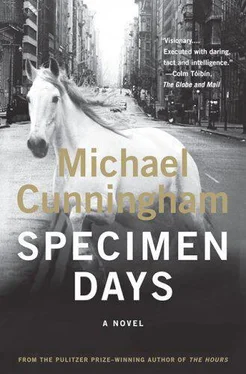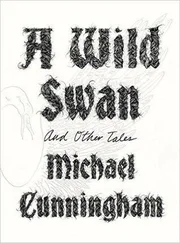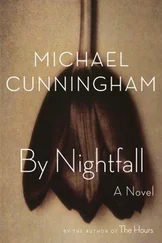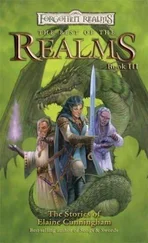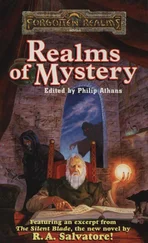Michael Cunningham - Specimen Days
Здесь есть возможность читать онлайн «Michael Cunningham - Specimen Days» — ознакомительный отрывок электронной книги совершенно бесплатно, а после прочтения отрывка купить полную версию. В некоторых случаях можно слушать аудио, скачать через торрент в формате fb2 и присутствует краткое содержание. Город: New York, Год выпуска: 2005, ISBN: 2005, Издательство: Farrar, Straus and Giroux, Жанр: Современная проза, на английском языке. Описание произведения, (предисловие) а так же отзывы посетителей доступны на портале библиотеки ЛибКат.
- Название:Specimen Days
- Автор:
- Издательство:Farrar, Straus and Giroux
- Жанр:
- Год:2005
- Город:New York
- ISBN:0-374-70515-1
- Рейтинг книги:4 / 5. Голосов: 1
-
Избранное:Добавить в избранное
- Отзывы:
-
Ваша оценка:
- 80
- 1
- 2
- 3
- 4
- 5
Specimen Days: краткое содержание, описание и аннотация
Предлагаем к чтению аннотацию, описание, краткое содержание или предисловие (зависит от того, что написал сам автор книги «Specimen Days»). Если вы не нашли необходимую информацию о книге — напишите в комментариях, мы постараемся отыскать её.
Specimen Days — читать онлайн ознакомительный отрывок
Ниже представлен текст книги, разбитый по страницам. Система сохранения места последней прочитанной страницы, позволяет с удобством читать онлайн бесплатно книгу «Specimen Days», без необходимости каждый раз заново искать на чём Вы остановились. Поставьте закладку, и сможете в любой момент перейти на страницу, на которой закончили чтение.
Интервал:
Закладка:
Michael Cunningham
SPECIMEN DAYS
This novel is dedicated to the memory of my mother, Dorothy
Fear not O Muse! truly new ways and days receive,
surround you,
I candidly confess a queer, queer race, of novel
fashion,
And yet the same old human race, the same within,
without,
Faces and hearts the same, feelings the same,
yearnings the same,
The same old love, beauty and use the same.
Author’s Note
Any writer who sets part or all of a novel in an identifiable time and place faces the question of veracity. The simplest answer is also the most severe historic events must be rendered with absolute precision. Battles must be fought where and when they were actually fought; zeppelins may not appear in the sky a moment before they were invented; a great artist cannot appear at a masked ball in New Orleans when he is known, on that particular evening, to have been recuperating from gout in Baton Rouge.
The strict sequence of historical events, however, tends to run counter to the needs of the storyteller. Biographers and historians may be required to account for all those missed trains, canceled engagements, and long periods of lassitude; the fiction writer is not necessarily so constrained. Novelists must usually decide what degree of slavish accuracy would make their stories more alive, and what degree would make them less. We seem to fall along a broad spectrum in this regard. I know novelists who wouldn’t think of tampering with recorded fact, and I know and greatly admire a certain writer who invents everything, from habits and customs during the time of Christ to botany and the workings of the human body. When questioned about it, he simply says, “It’s fiction.”
Specimen Days falls somewhere between those two poles. It’s semi-accurate. To the best of my ability, I’ve been true to historic particulars in the scenes I’ve set in the past. But it would be a mistake on the reader’s part to accept any of it as literal fact. I’ve taken especial liberty with chronology and have juxtaposed events, people, buildings, and monuments that may in fact have been separated by twenty years or more. Anyone interested in the absolute truth about New York in the mid to late nineteenth century would be well advised to consult Gotham by Edwin G. Burrows and Mike Wallace, which was the primary source from which I spun my own variations.
In the Machine
Walt said that the dead turned into grass, but there was no grass where they’d buried Simon. He was with the other Irish on the far side of the river, where it was only dirt and gravel and names on stones.
Catherine believed Simon had gone to heaven. She had a locket with his picture and a bit of his hair inside.
“Heaven’s the place for him,” she said. “He was too good for this world.” She looked uncertainly out the parlor window and into the street, as if she expected a glittering carriage to wheel along with Simon on board, serene in his heedless milk-white beauty, waving and grinning, going gladly to the place where he had always belonged.
“If you think so,” Lucas answered. Catherine fingered the locket. Her hands were tapered and precise. She could sew stitches too fine to see.
“And yet he’s with us still,” she said. “Don’t you feel it?” She worried the locket chain as if it were a rosary.
“I suppose so,” Lucas said. Catherine thought Simon was in the locket, and in heaven, and with them still. Lucas hoped she didn’t expect him to be happy about having so many Simons to contend with.
The guests had departed, and Lucas’s father and mother had gone to bed. It was only Lucas and Catherine in the parlor, with what had been left behind. Empty plates, the rind of a ham. The ham had been meant for Catherine’s and Simon’s wedding. It was lucky, then, to have it for the wake instead.
Lucas said, “I have heard what the talkers were talking, the talk of the beginning and the end. But I do not talk of the beginning or the end.”
He hadn’t meant to speak as the book. He never did, but when he was excited he couldn’t help himself.
She said, “Oh, Lucas.”
His heart fluttered and thumped against the bone.
“I worry for you,” she said. “You’re so young.”
“I’m almost thirteen,” he said.
“It’s a terrible place. It’s such hard work.”
“I’m lucky. It’s a kindness of them, to give me Simon’s job.”
“And no more school.”
“I don’t need school. I have Walt’s book.”
“You know the whole thing, don’t you?”
“Oh no. There’s much more, it will take me years.”
“You must be careful at the works,” she said. “You must” She stopped speaking, though her face didn’t change. She continued offering her profile, which was as gravely beautiful as that of a woman on a coin. She continued looking out at the street below, waiting for the heavenly entourage to parade by with Simon up top, the pride of the family, a new prince of the dead.
Lucas said, “You must be careful, too.”
“There’s nothing for me to be careful about, my dear. For me it’s just tomorrow and the next day.”
She slipped the locket chain back over her head. The locket vanished into her dress. Lucas wanted to tell her what? He wanted to tell her that he was inspired and vigilant and recklessly alone, that his body contained his unsteady heart and something else, something he felt but could not describe: porous and spiky, shifting with flecks of thought, with urge and memory; salted with brightness, flickerings of white and green and pale gold, like stars; something that loved stars because it was made of the same substance. He needed to tell her it was impossible, it was unbearable, to be so continually mistaken for a misshapen boy with a walleye and a pumpkin head and a habit of speaking in fits.
He said, “I celebrate myself, and what I assume you shall assume.” It was not what he’d hoped to tell her.
She smiled. At least she wasn’t angry with him. She said, “I should go now. Will you walk me home?”
“Yes,” he said. “Yes.”
Outside, on the street, Catherine slipped her hand into the crook of his elbow. He tried to steady himself, to stride manfully, though what he wanted most was to stop striding altogether, to rise up like smoke and float above the street, which was filled with its evening people, workingmen returning, newsboys hawking their papers. Mad Mr. Cain paced on his corner, dressed in his dust-colored coat, snatching distractedly at whatever crawled in his beard, shouting, “Mischief, gone and forgotten, what have ye done with the shattered hearts?” The street was full of its smell, dung and kerosene, acrid smoke something somewhere was always burning. If Lucas could rise out of his body, he would become what he saw and heard and smelled. He would gather around Catherine as the air did, touch her everywhere. He would be drawn into her when she breathed.
He said, “The smallest sprout shows there is really no death.”
“Just as you say, my dear,” Catherine said.
A newsboy shouted, “Woman brutally murdered, read all about it!” Lucas thought he could be a newsboy, but the pay was too low, and he couldn’t be trusted to call the news, could he? He might lose track of himself and walk the streets shouting, “Every atom belonging to me as good belongs to you.” He’d do better at the works. If the impulse overcame him, he could shout into Simon’s machine. The machine wouldn’t know or care, any more than Simon had.
Catherine didn’t speak as they walked. Lucas forced himself to remain silent as well. Her building was three blocks to the north, on Fifth Street. He walked her up onto the stoop, and they stood there a moment together, before the battered door.
Читать дальшеИнтервал:
Закладка:
Похожие книги на «Specimen Days»
Представляем Вашему вниманию похожие книги на «Specimen Days» списком для выбора. Мы отобрали схожую по названию и смыслу литературу в надежде предоставить читателям больше вариантов отыскать новые, интересные, ещё непрочитанные произведения.
Обсуждение, отзывы о книге «Specimen Days» и просто собственные мнения читателей. Оставьте ваши комментарии, напишите, что Вы думаете о произведении, его смысле или главных героях. Укажите что конкретно понравилось, а что нет, и почему Вы так считаете.
